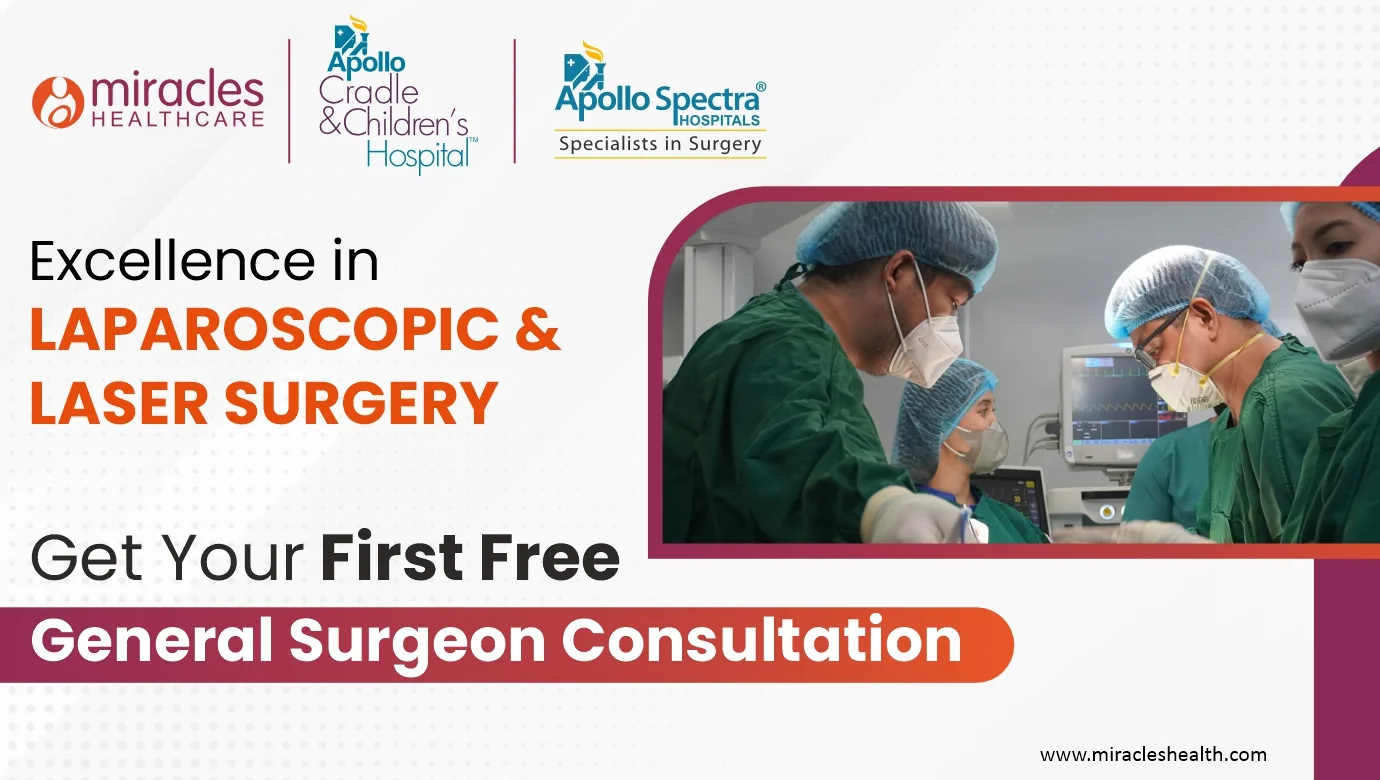General Surgery Conditions We Treat
Comprehensive Care for Your Health

Laser anal fissure surgery involves using a focused beam of light to precisely treat anal fissures, which are painful tears in the lining of the anal canal. The laser energy is used to vaporize the affected tissue, promoting healing and reducing the risk of complications. This minimally invasive procedure typically offers quicker recovery times and less post-operative discomfort compared to traditional surgical methods.
An anal fissure is a tear or crack in the lining of the anus, which can cause intense pain and discomfort, particularly during bowel movements. It can result from factors such as constipation, trauma to the anal region, passing large or hard stools. The common symptoms of anal fissure include pain, bleeding, itching, and sometimes a small lump near the tear.
Laser anal fissure surgery, also known as laser sphincterotomy, is a minimally invasive procedure used to treat anal fissures. During the surgery, a surgeon uses a medical laser to precisely target and remove the tissue around the fissure. This surgery promotes healing by stimulating the growth of new, healthy tissue. The laser energy helps to seal off blood vessels, reducing bleeding and minimizing the risk of infection. This surgery is often preferred over traditional surgical methods as it results in less pain, faster recovery times, and fewer complications. Additionally, the precise nature of the laser allows for greater control and accuracy during the procedure, minimizing damage to surrounding tissue.
Laser anal fissure surgery may be required when the fissure becomes chronic or recurrent. It is also recommended when conservative treatments for anal fissures, such as lifestyle modifications, topical medications, and sitz baths, fail to provide relief. Here are some reasons why laser anal fissure surgery might be necessary:
Constant Symptoms: If the symptoms of an anal fissure last despite conservative treatments, laser surgery may be recommended to address the underlying issue causing the discomfort.
Chronic or Recurrent Fissures: If you experience anal fissures that become chronic or keep recurring, leading to ongoing pain and discomfort. In such cases, surgical intervention may be necessary to promote healing and prevent further recurrence.
Severe Pain and Discomfort: Anal fissures can cause severe pain, especially during bowel movements, which can significantly impact the quality of life. Surgery may be required to relieve this pain and improve the comfort.
Complications: In some cases, anal fissure can lead to complications such as infections, abscesses, or fistulas. Surgery may be necessary to treat these complications and prevent further health issues.
Failure of Conservative Treatments: If conservative treatments for anal fissures fail to provide sufficient relief or if the fissure does not heal on its own over time. When the severity of symptoms requires a more definitive treatment approach to promote healing and relieve discomfort. Laser anal fissure surgery is considered to resolve the problem effectively.
The right candidates for laser treatment for fissure typically include individuals who:
Have constant or chronic anal fissures: Candidates may have experienced symptoms for an extended period despite trying conservative treatments.
Experience severe pain and discomfort: Individuals who suffer from severe pain and discomfort during bowel movements may be good candidates for surgery.
Have recurrent fissures: Those who experience recurrent anal fissures, meaning the anal fissure heals and then reappears. The surgery may help address the underlying issue causing the fissures.
Have failed conservative treatments: Individuals who have tried conservative treatments such as dietary changes, topical medications, and sitz baths without success may be suitable candidates for laser anal fissure surgery.
Have complications: Individuals who develop complications associated with anal fissures, such as infections, abscesses, or fistulas, may require surgical intervention to resolve these issues.
If you are considering laser surgery for a fissure, it is important to consult with the best doctor for fissure treatment near you. They will assess your condition, discuss treatment options, and determine if surgery is the most appropriate course of action based on your circumstances.
Preparing for laser surgery for fissure involves several steps to ensure the surgical procedure goes smoothly and to promote a successful recovery. Here's a general overview of what to expect and how to prepare:
Consultation with a General Surgeon: Schedule an online consultation with a general surgeon who specializes in anal fissure treatment. They will assess your condition, discuss the procedure, and address any questions or concerns you may have about the surgery or recovery process.
Medical Evaluation: Your surgeon may perform a thorough medical evaluation to ensure you are a suitable candidate for surgery. This may include checking your medical history, conducting a physical examination, and possibly ordering additional tests or diagnostic procedures.
Follow Preoperative Instructions: Your surgeon will provide specific preoperative instructions that may be related to dietary restrictions, medications to take or avoid, and bowel preparation such as using laxatives or enemas to empty your bowels before the procedure.
Follow Fasting Guidelines: Your surgeon will provide specific instructions regarding fasting before the surgery, typically requiring you to avoid eating or drinking anything for a certain period before the procedure. Following fasting guidelines helps reduce the risk of complications during anesthesia.
By following these steps and closely adhering to your surgeon's instructions, you can help ensure a successful outcome for your laser treatment for fissure and promote a smoother recovery process.
Here is an overview of the procedure of laser anal fissure surgery:
Anesthesia: Before the surgery starts, you will be given anesthesia to ensure you are comfortable and pain-free during the procedure. Depending on the specific circumstances and preferences, this may be general anesthesia or regional anesthesia.
Positioning: You will be positioned on the operating table in a way that allows the surgeon with access to the anal area while letting you remain as comfortable as possible.
Laser Treatment: The surgeon will use a laser technique to precisely target and remove the tissue around the anal fissure. The laser energy is directed at the affected area to vaporize the tissue, promoting healing and sealing off blood vessels to minimize bleeding.
Sphincter Muscle Preservation: Unlike traditional surgical methods that may involve cutting or stretching the anal sphincter muscle, laser anal fissure surgery to preserve the sphincter muscle integrity as much as possible. This helps reduce the risk of complications such as fecal incontinence.
Closure: After the fissure tissue is treated with the laser, the surgical site may be left open to heal naturally, or the surgeon may choose to close it with sutures or other techniques. The decision on the closure method depends on factors such as the size and location of the fissure and the surgeon's preference.
Laser anal fissure surgery offers several advantages over traditional surgical methods for treating anal fissures. Some of the key advantages include:
Minimally Invasive: Laser anal fissure surgery is minimally invasive, meaning it involves smaller incisions or no incisions at all compared to traditional surgical techniques. This results in less trauma to the surrounding tissue, reduced scarring, and faster recovery times.
Precise Treatment: The use of a specialized medical laser allows for precise targeting of the affected tissue, minimizing damage to healthy surrounding tissue. This precision promotes more effective treatment of the anal fissure while reducing the risk of complications.
Reduced Pain and Discomfort: Patients undergoing laser anal fissure surgery may experience less postoperative pain and discomfort compared to traditional surgical methods. The laser energy seals nerve endings, reducing pain sensation during and after the procedure.
Faster Recovery: Due to its minimally invasive nature and reduced tissue trauma, laser anal fissure treatment typically results in faster recovery times compared to traditional surgical techniques. Patients may be able to return to their normal activities sooner after the procedure.
Lower Risk of Complications: Laser anal fissure surgery is associated with a lower risk of complications such as impaired anal sphincter function or fecal incontinence compared to traditional surgical methods.
High Success Rates: Laser anal fissure surgery has been shown to have high success rates in treating anal fissures and relieving associated symptoms. Many patients experience long-term relief from pain and discomfort following the procedure.
Overall, laser anal fissure surgery offers numerous advantages. However, you need to discuss your circumstances and treatment options with an anal fissure treatment surgeon to determine the most appropriate approach for your condition.
After undergoing laser anal fissure surgery, you can expect a recovery period during which you may experience certain symptoms. For smooth recovery, you need to follow specific postoperative care instructions. Here is an overview of what to expect after laser anal fissure surgery:
Pain and Discomfort: You may experience Some degree of pain or discomfort after the surgery, especially during bowel movements. Your surgeon may prescribe pain management medications to help manage discomfort during the recovery period.
Bleeding: Minor bleeding from the surgical site may occur after the procedure and usually resolves on its own within a few days. If bleeding continues or becomes severe, you should contact your surgeon.
Sitz Baths: Taking warm sitz baths several times a day can help promote healing and relieve discomfort. Sitz baths involve sitting in a shallow basin of warm water for 10 to 15 minutes at a time.
Stool Softeners and Dietary Modifications: To prevent straining during bowel movements, your surgeon may advise you to take stool softeners and make dietary changes such as increasing fiber intake and staying hydrated. This helps keep stools soft and reduces the risk of irritation to the surgical site.
Activity Restrictions: While recovery times vary from person to person, patients are generally advised to avoid strenuous activities, heavy lifting, and vigorous exercise for some time after surgery. It's important to follow your surgeon's specific instructions regarding activity restrictions and gradually resume normal activities as you heal.
Follow-up Appointments: You will likely have follow-up appointments with your surgeon to monitor your healing progress and address any concerns or complications that may arise. It's important to attend these appointments and inform your surgeon regarding any changes in symptoms or concerns.
After undergoing laser anal fissure surgery, it's important to follow your surgeon's instructions for postoperative care to promote healing and reduce the risk of complications. Here are some general care guidelines to follow:
Pain Management: Take Over-the-counter pain relievers or pain medications as prescribed by your surgeon to manage any discomfort.
Dietary Modifications: Follow a high-fiber diet and drink plenty of fluids to soften stools and prevent constipation. Avoid foods that can irritate the anal area, such as spicy foods that are difficult to digest.
Stool Softeners: Use stool softeners as recommended by your surgeon to make bowel movements less painful and easier.
Sitz Baths: Take warm sitz baths several times a day to soothe the anal area, reduce discomfort and promote healing. Sit in a shallow basin of warm water for about 10-15 minutes at a time.
Wound Care: In case of an open surgical site, keep the area clean and dry, and avoid using harsh soaps or wipes that may irritate the skin. If sutures were used, follow your surgeon's instructions for wound care, including keeping the area clean and avoiding excessive moisture.
Avoid Straining: Avoid straining during bowel movements, as this can aggravate the surgical site and delay healing. Use stool softeners and dietary modifications to make bowel movements easier.
Physical Activity: Avoid strenuous activities, heavy lifting, and prolonged sitting during the initial recovery period. Gradually increase activity levels as tolerated, but listen to your body and avoid overexertion.
Follow-up Appointments: Attend all scheduled follow-up appointments with your surgeon to monitor healing progress and address complications. Report any changes in symptoms or signs of infection to your surgeon promptly.
Hygiene: Maintain good hygiene in the anal area by gently cleansing with warm water after bowel movements and patting dry with a soft towel. Avoid using harsh or scented toilet paper, which can irritate the skin.
By following these postoperative care guidelines and staying in close communication with your surgeon, you can support healing and minimize discomfort after laser anal fissure surgery. If you have any concerns about your recovery, don't hesitate to communicate with your surgeon for guidance and support.
While laser anal fissure surgery is generally considered safe and effective, like any surgical procedure, it carries some risks and potential complications. You need to be aware of these risks and discuss them with your surgeon before undergoing the procedure.
Some potential complications associated with laser anal fissure surgery include:
Infection: The risk of infection at the surgical site is generally low but can occur if proper wound care protocols are not followed or if the patient has underlying health conditions that increase vulnerability to infection.
Bleeding: Some degree of bleeding from the surgical site is common after laser anal fissure surgery. While minor bleeding normally resolves on its own, excessive bleeding may require immediate attention.
Pain and Discomfort: Some degree of pain and discomfort is common during the recovery period. This can usually be managed with pain medications prescribed by the surgeon.
Fecal Incontinence: While rare, there is a risk of temporary or permanent fecal incontinence following laser anal fissure surgery.
Anal Stenosis: In some cases, laser anal fissure surgery may result in a narrowing of the anal canal, known as anal stenosis. This can lead to difficulty with bowel movements and may require additional treatment to correct.
Recurrence of Fissure: While laser anal fissure surgery is effective in treating anal fissures, there is a risk of recurrence, especially if underlying factors such as constipation or straining during bowel movements are not addressed.
Allergic Reaction: Some patients may experience allergic reactions to medications or materials used during the surgical procedure, such as anesthesia or surgical dressings.
Damage to Surrounding Tissue: While laser surgery is highly precise, there is a risk of unintentional damage to surrounding tissue structures, such as the anal sphincter or nearby nerves.
Several factors can influence the cost of laser anal fissure surgery, including:
Healthcare Facility: The type of healthcare facility where the surgery is performed can significantly affect the cost. Costs may vary between hospitals, specialty clinics, and ambulatory surgical centers.
Geographic Location: The cost of healthcare services can vary significantly depending on the geographic location. Generally, urban areas and regions with higher costs of living tend to have higher healthcare costs.
Surgeon's Fee: The surgeon's fee for performing the procedure can vary based on their experience, and expertise.
Anesthesia Fee: The cost of anesthesia will also contribute to the overall cost of the surgery.
Preoperative Testing: The preoperative tests or evaluations, such as blood tests or imaging studies also add to the total cost.
Postoperative Care: The cost of postoperative care, including follow-up appointments with the surgeon and any necessary medications or wound care supplies, can also influence the overall cost of surgery.
Additional Procedures: If additional procedures are performed during the same surgical session due to complications can also increase the total cost of care.
Insurance Coverage: Health insurance coverage can vary widely in terms of what procedures are covered and to what extent. Patients should check with their insurance provider to understand their coverage and any out-of-pocket expenses they may be responsible for.
Miracles Apollo Cradle/Spectra stands as the best anal fissure surgery hospital in Gurgaon, offering a wide range of treatment for anal fissures including laser treatment. Our team of experienced surgeons specializes in advanced laser procedures, having successfully conducted numerous surgeries with exceptional outcomes. Equipped with state-of-the- art technology and a commitment to patient well-being, we deliver comprehensive preoperative evaluations and postoperative care. Trust us for compassionate and expert treatment tailored to your anal fissure needs.


Comprehensive Care for Your Health
Meet our expert team of General Surgeon where compassionate care meets expertise.
Inspiring Journeys: True Patient Stories
Miracles Apollo Cradle is a leading Maternity Hospital Gurgaon. We strive to give the best care to our patients.






Your Health, Our Network: Comprehensive Care Across Every Facility.
Learn about the world class health care we provide
Expert Advice and Health Tips
Learn about the world class health care we provide
Yes, Anal fissures can be treated effectively with laser surgery as it offers minimally invasive and precise treatment to promote healing and alleviate symptoms.
To clean a laser fissure effectively, carefully and gently wash the anal area with warm water and mild soap, avoid harsh rubbing or scrubbing and tap dry with a soft towel.
Fissure laser surgery is generally associated with less pain compared to traditional surgical methods, but you may still experience some discomfort during the procedure and the recovery period.
The fissure laser treatment recovery time varies depending on various factors. Typically, it takes about 1 to 2 weeks.
After laser anal fissure surgery, you may experience bleeding, discomfort, and pain during the bowel movements. As the recovery progresses, these symptoms will improve.
Yes, you can walk after laser fissure surgery, but your surgeon may recommend you avoid strenuous activities and heavy lifting during the initial recovery period.
It's common to experience some discomfort or pain during bowel movements after fissure surgery, but this typically improves over time as the surgical site heals and inflammation reduces.